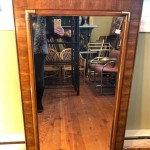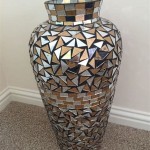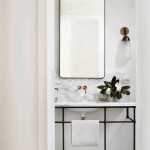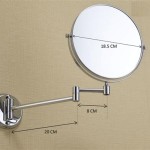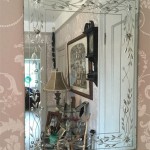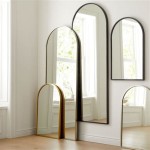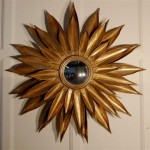Is It Ok To Have Mirrors In The Bedroom? A Comprehensive Examination
The question of whether it is acceptable to have mirrors in the bedroom is one that elicits varied responses, influenced by cultural beliefs, interior design principles, and personal preferences. There isn't a universally definitive answer, as the suitability of mirrors in a bedroom depends on a multitude of factors. This article aims to explore these factors, providing a comprehensive overview of the perceived benefits and drawbacks associated with bedroom mirrors.
From a purely functional perspective, mirrors serve a clear purpose: they reflect light, making a room appear larger and brighter. This can be particularly advantageous in smaller bedrooms where maximizing the sense of space is a priority. Additionally, mirrors are indispensable for personal grooming and dressing, providing a convenient way to check one's appearance before leaving the room. However, the potential benefits must be weighed against other considerations, including psychological impact and adherence to specific cultural or spiritual beliefs.
The decision to incorporate mirrors into a bedroom should be a thoughtful one, taking into account individual needs, aesthetic preferences, and any potential negative effects that might arise. Understanding the various arguments for and against bedroom mirrors is crucial for making an informed choice.
Feng Shui and the Placement of Mirrors
Feng Shui, the ancient Chinese practice of arranging spaces to promote harmony and balance, offers specific guidelines regarding the placement of mirrors, particularly in the bedroom. According to Feng Shui principles, mirrors possess the ability to reflect and redirect energy, known as "chi." Improper placement can disrupt the flow of chi and potentially lead to negative consequences.
One of the most common Feng Shui recommendations is to avoid placing a mirror directly opposite the bed. It is believed that a mirror facing the bed can lead to restlessness, insomnia, and even marital discord. The reflection of oneself while sleeping is thought to disturb the subconscious and create a sense of unease. Some interpretations suggest that the mirror creates a third party presence in the relationship, leading to infidelity or other relational problems.
Furthermore, mirrors are advised against being placed near doorways or windows where they might reflect external disturbances or negative energy into the room. The reflection of a cluttered space can also amplify negative energy, exacerbating feelings of stress and anxiety. In Feng Shui, ideally, mirrors should be placed in areas that enhance positive energy flow, such as reflecting natural light or visually expanding a small space without reflecting the bed.
If a mirror is unavoidable in the bedroom, Feng Shui practitioners often recommend covering it at night. This can be achieved with a curtain, a cloth, or even a simple piece of paper. Covering the mirror effectively neutralizes its reflective properties during sleep, preventing the disruption of chi and promoting a more restful night.
It's important to note that these are traditional beliefs, and their application is a matter of personal conviction. While some individuals find comfort and benefit from following Feng Shui principles, others may disregard them entirely.
Psychological Impact of Bedroom Mirrors
Beyond Feng Shui, the psychological impact of mirrors in the bedroom is a significant consideration. Mirrors can influence self-perception, body image, and even sleep quality. The relationship between an individual and their reflection can be complex and deeply personal.
For some, a mirror in the bedroom provides a sense of confidence and self-assurance. It offers a convenient way to check one's appearance and ensure they are presenting themselves in the best possible light. This can be particularly beneficial for individuals who are meticulous about their grooming or who derive satisfaction from observing their physical appearance. However, for others, frequent exposure to their reflection can trigger feelings of anxiety, insecurity, or body dysmorphia.
Constantly scrutinizing one's appearance in a mirror can exacerbate existing body image issues. Individuals who are already self-conscious about their weight, skin, or other physical features may find that a bedroom mirror reinforces negative thoughts and feelings. This can lead to a cycle of self-criticism and dissatisfaction, negatively impacting self-esteem and overall well-being.
Moreover, the presence of a mirror in the bedroom can be a constant reminder of societal beauty standards and the pressure to conform. This can be particularly detrimental for young people who are still developing their sense of self and struggling to navigate the complexities of body image. It is important to consider the potential impact on vulnerable individuals before placing a mirror in their bedroom.
The placement of the mirror can also play a role in its psychological impact. A mirror positioned to reflect the bed can create a sense of vulnerability or exposure, especially for individuals who are already prone to anxiety or paranoia. The feeling of being watched or scrutinized, even by oneself, can disrupt sleep and contribute to feelings of unease. In contrast, a mirror placed in a more discreet location, such as inside a closet or on the back of a door, may have a less pronounced psychological effect.
Ultimately, the psychological impact of bedroom mirrors is subjective and dependent on individual factors. It is crucial to be mindful of one's own relationship with their reflection and to make informed decisions about mirror placement based on personal needs and preferences. If mirrors contribute to negative self-perception or anxiety, it may be best to remove them from the bedroom or to cover them when not in use.
Practical Considerations and Interior Design
Beyond cultural beliefs and psychological factors, practical considerations and interior design principles also influence the appropriateness of mirrors in the bedroom. The size, shape, and placement of a mirror can significantly impact the overall aesthetic of the room, as well as its functionality.
From a practical standpoint, the size of the bedroom is a key factor to consider. In small bedrooms, mirrors can be incredibly effective in creating the illusion of more space. A large mirror placed on a wall can visually double the size of the room, making it feel less cramped and more open. However, in larger bedrooms, the effect may be less pronounced, and a smaller mirror may be sufficient for practical purposes such as grooming and dressing.
The shape of the mirror can also contribute to the overall design aesthetic. Rectangular mirrors are a classic choice that complements a wide range of interior styles. Round or oval mirrors can add a touch of softness and femininity to the room. Uniquely shaped mirrors can serve as statement pieces, adding personality and visual interest to the space. The choice of mirror shape should be carefully considered to ensure it aligns with the overall design vision.
The placement of the mirror should also be carefully considered to maximize its functionality and aesthetic appeal. A full-length mirror is ideal for checking one's outfit from head to toe, while a smaller mirror placed above a dresser or vanity provides a convenient space for applying makeup or styling hair. Mirrors can also be strategically placed to reflect natural light, brightening up a dark corner or enhancing the overall ambiance of the room.
When incorporating mirrors into a bedroom, it is important to avoid creating a distracting or overwhelming effect. Too many mirrors can make the room feel cluttered and disorienting. It is best to choose a few well-placed mirrors that serve a specific purpose and complement the overall design. The frame of the mirror should also be carefully chosen to match the existing decor and create a cohesive look.
Finally, consider the lighting in the bedroom when placing mirrors. Poor lighting can render a mirror useless for grooming or dressing purposes. Ensure that the mirror is adequately lit with natural or artificial light. Avoid placing a mirror in a location where it will be obscured by shadows or glare. By carefully considering these practical and design factors, it is possible to incorporate mirrors into a bedroom in a way that enhances its functionality and aesthetic appeal.

The Feng Shui Of Mirror Placement In Your Bedroom City Mattress

Best Mirror Position In Bedroom As Per Vastu Designcafe

Where Should Mirrors Be Placed In A Bedroom For Feng Shui

Where Should Mirrors Be Placed In A Bedroom For Feng Shui Storables

Feng Shui Quick Tip Mirrors In Bedrooms

Why Having Your Mirror Facing Bed Is Bad Feng Shui

Should You Have A Mirror In Your Bedroom Why Feng Shui Experts Warn Against It Storables

Where To Put Mirror In Bedroom 9 Best Places Re Decor More

Where To Put Mirror In Bedroom Luxury Art Canvas

Should You Put A Mirror In Every Room Of Your Home Giant Glass

